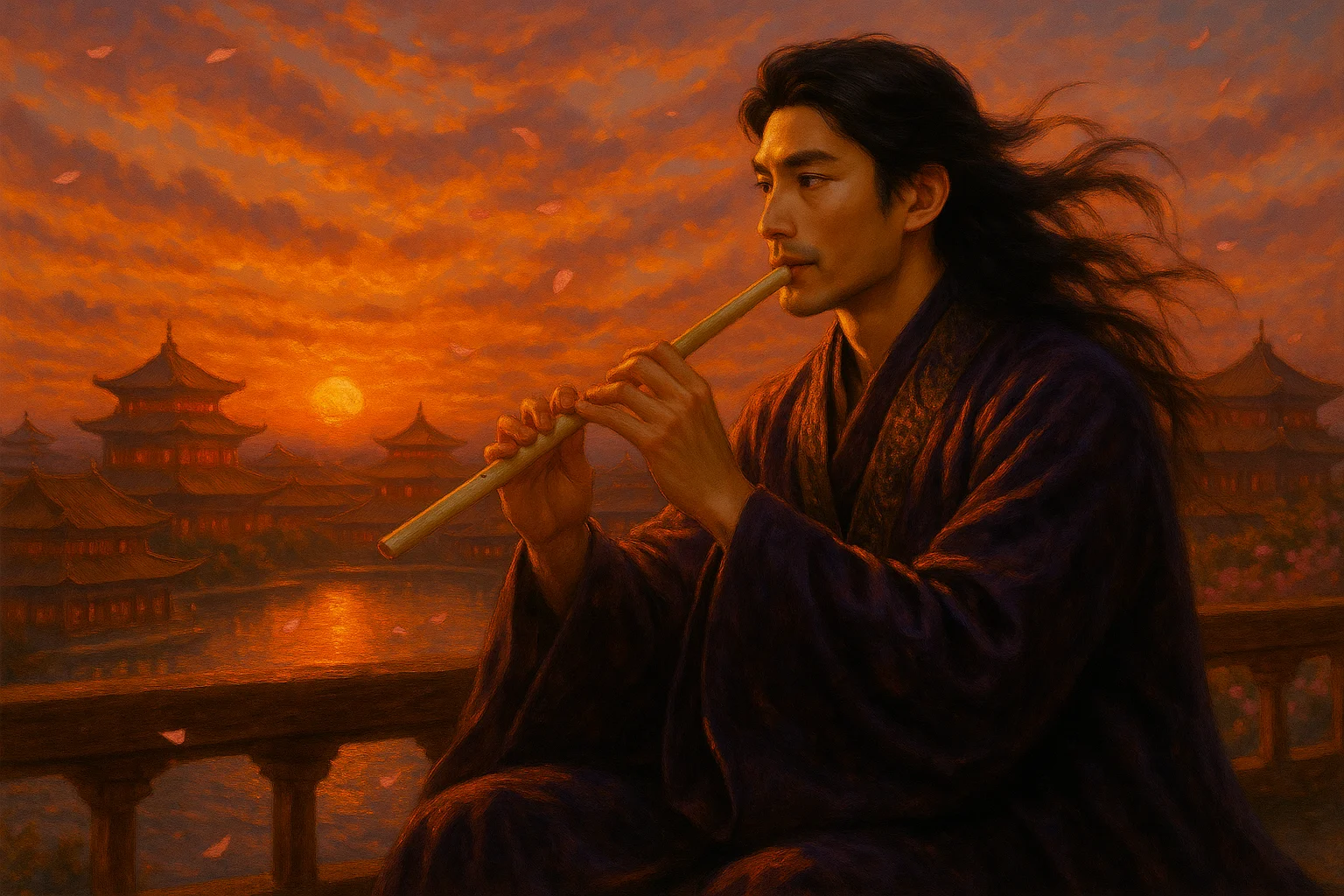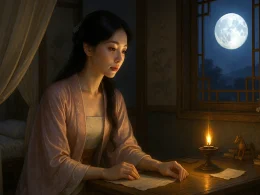Flowers are endless, willows beyond count;
They share my feelings, I dare vow.
Drain a boat-shaped cup of wine at one draught!
Where can we not meet somehow?
Red strings are mute,
Few are the connoisseurs.
If Heaven had a heart, it would turn old.
Look at the fame-and-gain world, I’m told:
A dream both past and present, dim and cold.
Original Poem
「喜迁莺 · 花不尽」
花不尽,柳无穷。
应与我情同。
觥船一棹百分空。
何处不相逢。朱弦悄。知音少。
晏殊
天若有情应老。
劝君看取利名场。
今古梦茫茫。
Interpretation
This lyric was composed during the mid-Northern Song Dynasty when Yan Shu held high office. Renowned for his literary talent since childhood, Yan passed the imperial examination at a young age and rose smoothly to the position of prime minister. However, the political climate of his time was far from clear - factional strife and power struggles made the officialdom a battlefield. Though framed as a farewell poem, the work reveals clear-eyed insight into life's realities and subtle weariness. Its tone stands out among Yan's works for its rare world-weariness and melancholy, subtly conveying his profound reflections on political turmoil and life's impermanent reunions.
First Stanza: "花不尽,柳无穷。应与我情同。觥船一棹百分空。何处不相逢。"
Huā bù jìn, liǔ wú qióng. Yīng yǔ wǒ qíng tóng. Gōng chuán yī zhào bǎi fēn kōng. Hé chù bù xiāng féng.
Flowers bloom without end, willows stretch beyond sight - / They share my boundless parting sorrow. / Though we drain the wine boat cup by cup, / Where in this world won't we meet again?
The opening uses nature's infinity (flowers and willows) to mirror the depth of parting emotions, achieving subtle melancholy without sentimentality. "Draining the wine boat" alludes to Du Mu's poetry, expressing surface optimism masking inner sorrow. The consolation "we'll meet again" carries undertones of resignation, revealing the poet's clear understanding of life's impermanent reunions.
Second Stanza: "朱弦悄。知音少。天若有情应老。劝君看取利名场。今古梦茫茫。"
Zhū xián qiāo. Zhīyīn shǎo. Tiān ruò yǒuqíng yīng lǎo. Quàn jūn kàn qǔ lìmíng chǎng. Jīngǔ mèng mángmáng.
Vermilion strings fall silent, true friends are few - / Were heaven capable of feeling, it too would age. / I urge you to see through fame's marketplace: / Past and present dissolve into boundless dreams.
The stanza shifts to direct expression - the silent zither strings symbolize loneliness after a confidant's departure. "Heaven would age if it could feel" borrows Li He's imagery to convey profound, universal sorrow. The conclusion reduces the pursuit of fame to "boundless dreams," subtly critiquing political vanities while advocating transcendence. The progression from personal parting to philosophical reflection demonstrates Yan Shu's characteristic blend of emotional depth and intellectual clarity.
Holistic Appreciation
Though framed as a farewell poem, this lyric carries far deeper emotional resonance than conventional parting verses. The first stanza imbues objects with sentiment—willows and blossoms mirror lingering attachment—expressed through tender language and enduring affection. The second stanza turns inward, confronting life’s essence: the rarity of kindred spirits and the illusory nature of fame and fortune. Tightly structured and emotionally progressive, the poem moves from the含蓄 restraint of initial separation to the sobering clarity of lived insight, culminating in philosophical meditation—both poignant and profound.
Artistic Merits
- Emotion Embodied in Nature, Layered Progression: Beginning with flora to reflect parting’s lingering ache, it unfolds into contemplation of life’s meetings/partings and fortune’s impermanence.
- Interplay of Tangible and Ethereal, Gentleness with Gravity: Beneath its lyrical surface lies unflinching worldly insight and self-awareness.
- Seamless Classical Allusions: Phrases like "a boatful of wine" and "if heaven had feelings" repurpose older poetic tropes, woven organically to enrich the verse’s depth.
- Fluid Language, Distinctive Style: Departing from Yan Shu’s typical dignified elegance, this work leans toward Su Shi’s and Li Houzhu’s清冷 melancholy, showcasing his stylistic range.
Insights
Despite his exalted status as chancellor, Yan Shu here voices stark disillusionment with "the arena of profit and fame," revealing a seasoned mind’s somber philosophy. He uses nature’s constancy to highlight human transience, drowns sorrow in wine to lament scarce camaraderie, and ultimately lays bare the dreamlike quality of all eras—a wake-up call. More than a farewell, this poem interrogates merit, kinship, and life’s meaning. For modern readers, it whispers: Amid life’s turbulence and relational冷暖, hold fast to your core; see through名利’s haze, lest you squander your brief candle.
Poem Translator
Xu Yuanchong (许渊冲)
About the Poet

Yan Shu (晏殊 991 – 1055) Originaire de Fuzhou dans le Jiangxi, Yan Shu fut le maître fondateur de l'école wanyue (élégante et retenue) de la poésie ci sous les Song du Nord. Enfant prodige entré dans l'administration à quatorze ans, ses ci allient noblesse classique et méditation philosophique dissimulée sous des évocations de prospérité raffinée. Mentor de talents comme Fan Zhongyan et Ouyang Xiu, il initia l'École du Jiangxi en poésie ci et posa les bases de l'épuration du genre sous les Song.












